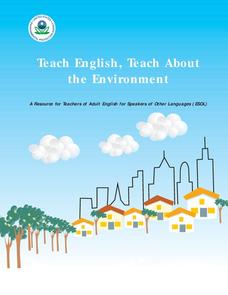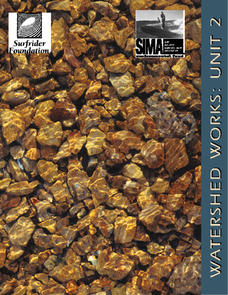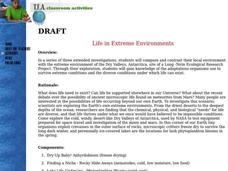US Environmental Protection Agency
Teach English, Teach About the Environment
Spread the message of recycling while teaching your English language learners new vocabulary and practicing verb tenses. Included here are four lesson plans for each level (beginning, intermediate, and advanced) as well as accompanying...
Curated OER
Living in Extreme Environments: Havens on the Deep Sea Floor
Students identify the characteristics of an extreme environment in the deep ocean and consider what organisms need to survive in these elements. They research sampling and data collection methods in this environment.
Curated OER
Survival: The Human Body in Extreme Environments
Learners name and describe the major systems that work together as a unity to monitor and regulate the human body as it goes about its business of securing the essential requirements for life. They identify specific human features and/or...
Calculated Industries
Army Survival
Intended as a reference tool for US Army personnel, this application can be used in a classroom that is studying historic and current wars or as part of an outdoor education or wilderness survival course. Some of the subjects addressed...
Curated OER
Watershed Works: Unit 2
The second of a three-unit lesson plan, this focuses on how human-made structures affect watersheds. Using watershed models that were built during the first unit, junior geologists now place buildings, dams, or levees into the models and...
Curated OER
Extreme Environments
Students examine extreme environments and the characteristics that make them. In this adaptation lesson students see how animals have adapted to these environments.
Curated OER
Life in Extreme Environments
Students compare and contrast local environments with the extreme environment of the Dry Valleys, Antarctica. Students explore and gain knowledge of the adaptations organisms use to survive extreme conditions and the diverse conditions...
Curated OER
Living in Extreme Environments
Students examine the characteristics of the ocean floor and the importance of of extreme environments. In this investigative lesson students use four methods to sample populations, gather, record and analyze data from a scientific...
Curated OER
Life in Extreme Environments - Who is on Top in the Food Chain?
Students discuss the design of experiments to determine how much and how fast rotifers feed and design experiments with a lab partner and in small collaborative groups. They then collect data from experiments and present results of...
Howard Hughes Medical Institute
What is My Carbon Footprint?
Here is a lesson that walks youth through an online carbon footprint calculator produced by the University of California, Berkeley. Once learners finish inputting information, they compete a worksheet with the results. This is simple,...
Curated OER
Survival: The Human Body in Extreme Environments
Students create a list of signs the human body gives during threatening weather conditions. They investigate the causes and conditions of dehydration, overheating, and hypothermia.
Curated OER
Adaptations of Fishes for Survival in Polar Environments
Students compare the anatomy of temperature and polar fishes. They explore the adverse effects of cold on metabolism and physiology and discuss how polar fishes adapt to their environments. Comparisons are also made to the DNA sequences...
Curated OER
How Can We Live Here? Life In Extreme Environments
Students explore the limits of life on Earth to extend their beliefs about life to include its possibility on other worlds. They investigate three hypothetical environments and the bacterial life forms that could exist on Earth.
It's About Time
Energy Flow in Ecosystems
Emerging biochemists more fully understand the flow of energy in ecosystems as they explore the laws of thermodynamics and relate them to energy transfer in food chains. They also investigate heat loss from the human body and how...
NOAA
Animals of the Fire Ice
When the sun's rays can't reach the producers in a food web, where does all the energy come from? Extreme environments call for extreme food sources. Young scientists investigate creatures that appear to get their energy from methane...
Chymist
Build a Spectroscope
Assist your emerging scientists with construction of their very own spectroscopes. Individuals construct a spectroscope to identify elements used in varying lights within a particular environment. They conclude the activity with a...
Kenan Fellows
The Little Stuff Can Make a Big Difference
Great things come in small packages! What better way to illustrate this point than a week-long look at nanotechnology? Earth science scholars explore water quality issues through lab activities, then research new innovations in nanotech...
Rochester Institute of Technology
Heat Transfer
Use an exciting role play activity to teach young chemists about the importance of heat transfer in maintaining homeostasis. They assume the role of a dog sled owner who has been abandoned and must fend for themselves with only a...
Prince William Network
Migration Headache
During this game, kids become migratory shorebirds and fly among wintering, nesting, and stopover habitats. If they do not arrive at a suitable habitat on time, they do not survive. Catastrophic events are periodically introduced that...
NOAA
Deep-Sea Benthos
Much like a distant planet, the underwater world of deep-sea benthos is strange and largely unknown. How do creatures survive and thrive in such extreme pressure and temperature conditions? Young oceanographers join the crew of Operation...
Curated OER
Activity 1: The Effect of Cold on Characteristics Important to Fishes
Students explore how organisms are adapted to live in the ultimate of extreme environments. They discuss the reasons for the similarities and differences between them, themselves, and the more familiar organisms around them. Students are...
Curated OER
Life In Extreme Environments
Students work together to design and participate in experiments to determine the rate rotifers eat. After completing their experiments, they record and analyze their data and identify any challenges faced during the procedure. They...
Curated OER
Living in Extreme Environments
Students explore the living conditions needed to grow bacteria. They develop an experiment that will test the ability of bacteria to survive various temperature extremes. In addition, they complete a lab reprt to share their results.
Curated OER
Change or Adaptation
Young scholars identify the adaptive forces in the life cycle of plants, animals, and humans, isolate and identify the role that change and adaptation play in extreme environments and research and write a short term paper using MLA...

























